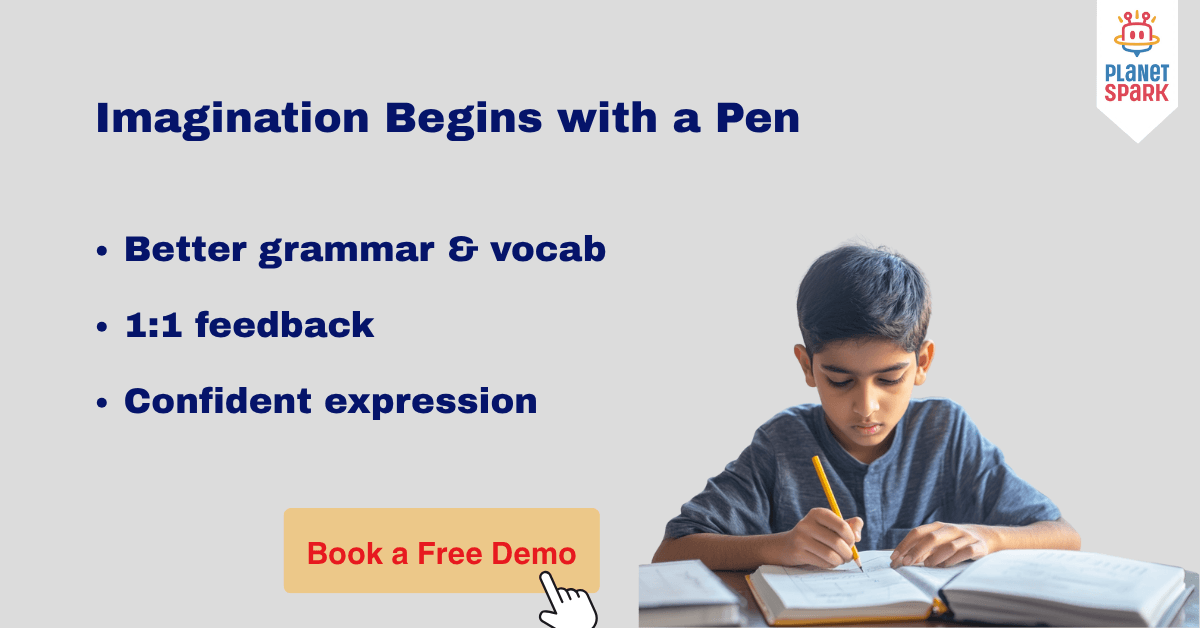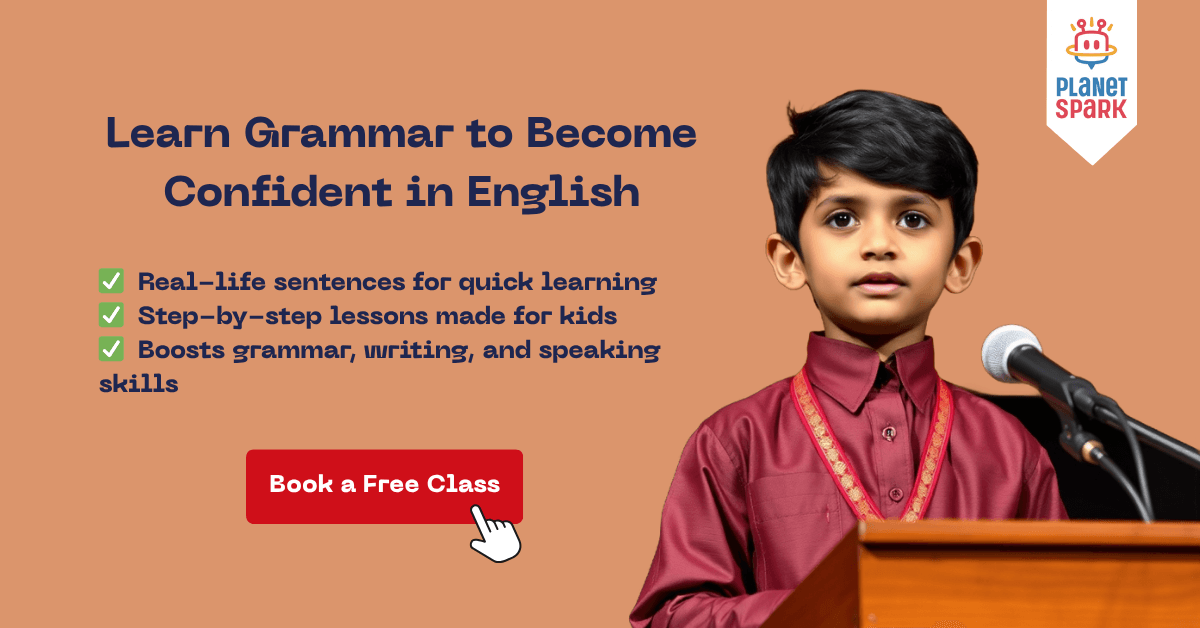Nouns for Kids - Basic building blocks of English grammar
Last Updated At: 20 Aug 2025
6 min read

Nouns are the backbone of English grammar. They name everything around us - people, places, objects, emotions, and ideas. Without nouns, we wouldn’t be able to form even the simplest sentence.
For students learning English, especially from Class 4 to Class 8, mastering nouns is the first step toward strong grammar and confident communication.
In this blog, you’ll learn:
What nouns are (with simple examples)
All major types of nouns
Grammar rules and common errors
Fun noun exercises
And how PlanetSpark helps your child master them
Let’s get started!
What Is a Noun?
A noun is a word that names a person, place, thing, or idea. It's one of the eight parts of speech and one of the first grammar concepts students learn.

Examples:
Person: Rahul, doctor, mother
Place: Delhi, school, mountain
Thing: Table, car, phone
Idea/Feeling: Honesty, happiness, freedom
👉 Quick Tip: If you can place “a,” “an,” or “the” before a word and it makes sense, it’s likely a noun.
Example: a phone, an elephant, the moon
Nouns can act as:
The subject: The cat slept.
The object: She opened the door.
Why Nouns are Important
Nouns are essential for expressing thoughts clearly and effectively. Here’s why they matter:
Every sentence contains at least one noun
They help you name and describe the world
Nouns give meaning and structure to speech and writing
They are the foundation for learning other grammar topics like verbs, adjectives, and articles
Example:
Without nouns: Went there and did that.
With nouns: I went to the library and read a book.
Download a free worksheet to learn more - Nouns in Sentences for class 1
Types of Nouns
Let’s explore the main types of nouns your child should know with clear definitions, examples, and tips.
1. Proper Nouns vs Common Nouns
Proper nouns refer to specific names and are always capitalized.
Examples: Riya, India, ChristmasCommon nouns are general names and are not capitalized unless at the beginning of a sentence.
Examples: girl, city, holiday
| Common Noun | Proper Noun |
|---|---|
| river | Ganga |
| actor | Shah Rukh Khan |
| monument | Qutub Minar |
2. Concrete vs Abstract Nouns
Concrete nouns are things you can see, hear, touch, taste, or smell.
Examples: flower, chair, chocolateAbstract nouns refer to ideas, feelings, or qualities.
Examples: truth, love, courage
3. Collective Nouns
A collective noun refers to a group of people, animals, or things as a single unit.
Examples: team, flock, bunch, army, class
Sentences:
The team is ready for the match.
A flock of birds flew overhead.
4. Compound Nouns
A compound noun is formed by joining two or more words.
Types:
Closed: toothpaste, notebook
Hyphenated: mother-in-law, sister-in-law
Open: swimming pool, dining table
Examples in sentences:
I bought a new notebook.
We met at the post office.
5. Countable vs Uncountable Nouns
Countable nouns can be counted. They have singular and plural forms.
Examples: book, apple, childUncountable nouns cannot be counted individually.
Examples: milk, sugar, information
| Countable | Uncountable |
|---|---|
| two chairs | some water |
| three pens | a lot of rice |
6. Material Nouns
Material nouns refer to substances or materials that things are made from.
Examples: gold, silver, cotton, water, iron
Sentences:
The ring is made of gold.
Clothes are made from cotton.
Grammar Rules and Usage Tips
Here are some important grammar rules related to nouns:
1. Capitalization
Proper nouns always start with a capital letter.
Incorrect: i live in delhi.
Correct: I live in Delhi.
2. Plural Formation
Add -s: pen → pens
Add -es: box → boxes
Irregular forms: child → children, man → men
3. Articles with Nouns
Use a/an with singular countable nouns: a cat, an owl
Use the for something specific: the sun, the school
4. Possessive Form
Add ’s to show possession: Maya’s book, the teacher’s desk
Noun Exercises (with Answers)
Make learning fun! Try these quick activities:
Exercise 1: Identify the Nouns
The dog barked loudly.
Happiness is important.
I saw birds and clouds.
Answers:
dog
happiness
birds, clouds
Exercise 2: Classify the Nouns
Label each as Proper, Common, Collective, or Abstract:
Rahul
Courage
Army
City
Answers:
Proper: Rahul
Abstract: Courage
Collective: Army
Common: City
Exercise 3: Fill in the Blanks
She gave me a box of _______. (chocolates)
The _______ is shining. (sun)
My _______ teaches math. (teacher)

Benefits of Learning Nouns Early
Builds a strong grammar foundation
Helps kids express ideas more confidently
Improves sentence framing
Enhances academic writing and speaking skills
Boosts performance in school English tests and competitive exams
Conclusion
Nouns are the very first grammar concept your child should master because they’re used in nearly every sentence we speak or write.
From naming people and places to expressing emotions and ideas, nouns help us communicate clearly and effectively.
Want to make grammar fun and easy for your child?
Book a FREE trial class with PlanetSpark and let your child experience engaging, expert-led grammar learning!
Learn Nouns and English Grammar with PlanetSpark
At PlanetSpark, we understand that grammar is more than just rules it’s a life skill. Our English Grammar classes for kids are designed to make concepts like nouns, verbs, adjectives, and sentence formation easy, engaging, and practical.
Why Parents Choose PlanetSpark:
✅ 1:1 Live Classes – Every child gets individual attention from expert teachers
✅ Personalised Learning Path – Based on your child’s grade and grammar level
✅ Gamified Practice – Interactive quizzes and games make grammar fun
✅ Real-world Application – Kids learn to use grammar while speaking and writing
✅ Detailed Progress Reports – See how your child is improving week by week
Whether your child is struggling with the basics or ready for advanced grammar topics, PlanetSpark’s curriculum adapts to their pace and potential.
🎯 Build fluency, accuracy, and confidence one grammar concept at a time.
FAQs About Nouns
Q1. What are 5 examples of nouns?
Apple, teacher, city, truth, dog
Q2. What are the 8 types of nouns?
Proper, Common, Collective, Concrete, Abstract, Compound, Countable, Uncountable
Q3. What is a noun for Class 8?
A noun is a word that names a person, place, thing, or idea. Class 8 students should also understand plural rules, countable vs uncountable nouns, and abstract vs concrete nouns.
Q4. How do I teach nouns to my child?
Use real-world examples, interactive games, simple worksheets, and grammar-based stories. Enroll in a fun grammar course like PlanetSpark to support learning.
Recommended Tests
Personalized Communication Report
Record a video to get a AI generated personalized communication report for your child
Select Learner's Class
